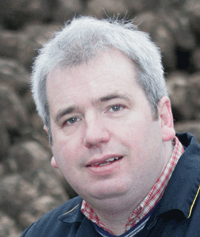Arable Farmer Focus: Philip Bradshaw hosts soil biology course

We finally got our drilling up to date at the end of October, with 10ha of KWS Sterling wheat following potatoes on some light land here at Whittlesey.
We still have more wheat to drill when the rest of our sugar beet is lifted, hopefully in early December. When conditions allow, we also have some spraying to do, particularly fungicides and Nutri-Phite PGA on oilseed rape.
I have now been able to tackle the last few bits of wheat drying, between the showers and various other tasks. With a mixed approach to grain marketing, I recently sold some wheat at stronger prices. But like many others, I have a small proportion sold forward that with hindsight was a mistake.
We hosted a soil biology course in our meeting room, which I attended. The course tutor was Joel Williams, an Australian consultant in biological farm practices, who fascinated 22 delegates from across the country with an intensive introduction to soil biology, rounded off with presentations on compost and compost tea, which I am pleased to confirm is for soil/plant application.
I have devoted lots of time to studying soil physics and chemistry, but probably not nearly enough on the biology of the soil, and the soil foodweb. I’m happy with the results from our relatively conventional farming process, and the level of environmental responsibility that we practice. However, I’m also open to learn more about the soil biological profile and consider other strategies to enhance what we do further.
Therefore, I shall be reading further on the subject and would suggest the website www.soilfoodweb.com is worth a look. I’d also like to thank Will Scale and the No-Till Alliance for putting on the day. This young organisation is working nationally to share best practice in sustainable direct drilling and no-till establishment.

